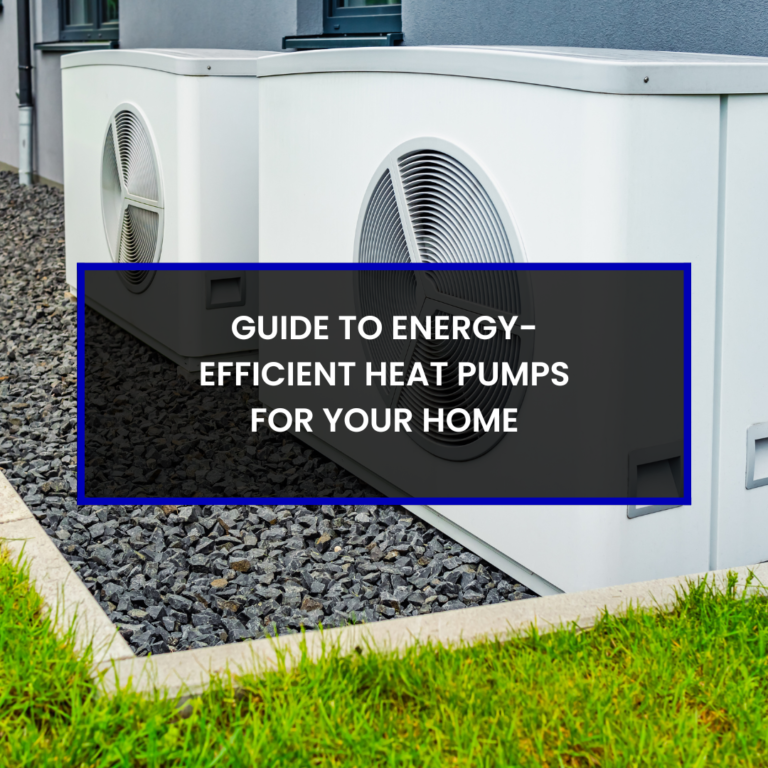Introduction
Heat pumps are not just an alternative to traditional heating and cooling systems; they are a forward-thinking solution for energy-efficient home climate control. By leveraging the ambient air or ground temperature, they provide a dual-functionality system capable of both warming and cooling your living spaces. This guide aims to shed light on the myriad benefits, options, and considerations associated with selecting the ideal heat pump for your home, ensuring you make an informed decision that aligns with your energy efficiency goals and comfort needs.
The Dual Benefits of Heat Pumps: Efficiency and Versatility
Heat pumps stand out for their remarkable ability to serve as both heaters in the chilly months and air conditioners during the warmer seasons. This versatility is complemented by their exceptional energy efficiency, which can lead to significant cost savings on utility bills over time. By harnessing the relatively stable temperature of the outside air or the ground, heat pumps operate on less energy while maintaining optimal indoor comfort, making them an ideal choice for environmentally conscious homeowners looking to reduce their carbon footprint and energy expenses alike.
Heat Pumps and Environmental Sustainability
The shift towards sustainable living practices has seen a rise in the adoption of electric vehicles, a trend mirrored in the growing popularity of heat pumps for residential heating and cooling. They contribute to a reduction in fossil fuel dependence, offering a cleaner, more sustainable alternative that aligns with modern environmental conservation efforts. By choosing a heat pump, you’re not only investing in a cost-effective climate control solution but also participating in the global movement towards a more sustainable and less carbon-intensive future.
Finding Your Perfect Match
Split System Heat Pumps: Ideal for most residential settings, split system pumps feature an outdoor unit that works in tandem with one or more indoor units, providing efficient heating and cooling. These systems are especially suitable for homes with existing ductwork and can be seamlessly integrated into your current HVAC infrastructure.
Packaged Heat Pumps: Packaged units combine heating and cooling capabilities into a single outdoor unit, making them a space-saving solution for smaller homes or those with limited indoor space for additional HVAC equipment. These systems are known for their ease of installation and maintenance.
Geothermal Heat Pumps: Utilizing the consistent temperature of the earth, geothermal systems offer unparalleled efficiency for both heating and cooling. Although the initial installation cost can be higher, the long-term energy savings and minimal environmental impact make them a worthwhile investment for the eco-conscious homeowner.
Ductless Heat Pumps: For homes without existing ductwork or those requiring a flexible solution for room additions or specific zones, ductless mini-splits are an efficient and versatile choice. These systems allow for individual room control, enhancing comfort and efficiency.
Making the Connection: Engage with Hometown Heating Today
Choosing the right heat pump for your home is a significant decision that can impact your comfort, energy consumption, and wallet. At Hometown Heating, we’re committed to helping you navigate this choice with expert advice and personalized solutions. Contact us today for a consultation or request a quote directly through our website, and take the first step towards a more comfortable, energy-efficient home.
Your Trusted Partner in Comfort: Hometown Heating’s Commitment
At Hometown Heating, our expertise goes beyond just installing heat pumps; we’re dedicated to ensuring your total satisfaction with our services and the performance of your heating and cooling system. We stand by our work with comprehensive warranties, reliable after-sales support, and a steadfast commitment to quality. Trust us to be your partner in achieving the perfect indoor climate for your home.
Frequently Asked Questions About Heat Pumps
What Makes Heat Pumps Energy-Efficient?
Heat pumps are lauded for their energy efficiency because they transfer heat instead of generating it through combustion. This process requires significantly less electrical energy, particularly in mild climates where the temperature differential is not extreme. By utilizing the ambient air or ground as a source for heating and cooling, heat pumps maintain comfortable indoor temperatures with a fraction of the energy used by traditional HVAC systems.
Can Heat Pumps Provide Adequate Warmth in Cold Climates?
Modern advancements in heat pump technology have significantly improved their performance in colder climates. Systems designed for cold weather can extract heat from outdoor air even at very low temperatures, providing reliable and efficient heating. For extremely cold regions, geothermal heat pumps, which draw heat from the ground, offer consistent performance regardless of air temperature.
Are Heat Pumps Cost-Effective Compared to Traditional HVAC Systems?
While the initial investment in a heat pump can be higher than traditional heating systems, the long-term savings on energy bills make them a cost-effective choice. The efficiency of heat pumps translates into lower monthly utility costs, and when factoring in potential tax credits and rebates for energy-efficient appliances, heat pumps become an economically smart option for many homeowners.
How Long Do Heat Pumps Typically Last?
With proper maintenance, heat pumps can have a long lifespan, often ranging between 15 to 20 years. Their durability depends on various factors including the quality of the installation, the model of the system, and how well it is maintained. Regular servicing and timely repairs can extend the life of your heat pump, ensuring it provides efficient heating and cooling for many years.
Do Heat Pumps Require a Lot of Maintenance?
Heat pumps require similar maintenance to traditional HVAC systems, which includes regular checks and cleaning of filters, coils, and fans. Scheduling an annual professional maintenance check can help ensure optimal performance and prevent minor issues from turning into costly repairs. Homeowners can also perform simple tasks, such as keeping the area around the outdoor unit clear of debris, to maintain the system’s efficiency.





